Taxation Law Report: Taxation of Income and Capital Gains in Australia
VerifiedAdded on 2020/11/23
|10
|2642
|408
Report
AI Summary
This report provides an overview of Australian taxation law, addressing the treatment of annuity income from lottery winnings, the computation of taxable income for a pharmacy, and the relevance of the IRC v Duke of Westminster case regarding tax avoidance in the Australian context. It further examines the allocation of losses, expenses, and capital gains or losses arising from the sale of a rental property, considering relevant deductions and the treatment of losses. The report explores these topics through case studies and legal principles, offering a comprehensive analysis of taxation concepts and their practical application. The analysis includes the specifics of GST exemptions, the implications of tax avoidance, and the handling of capital losses and gains, providing a detailed insight into the complexities of Australian taxation law.
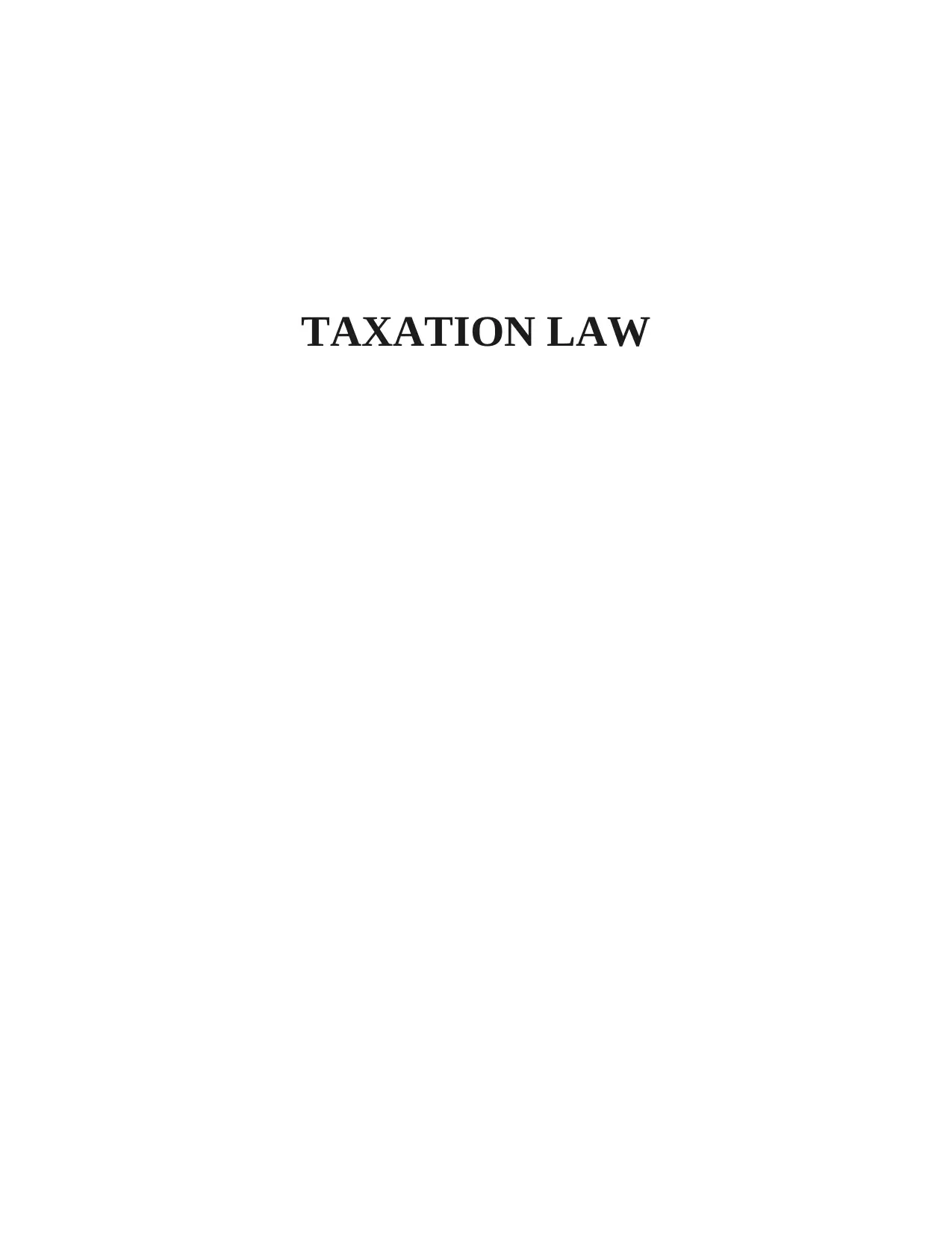
TAXATION LAW
Paraphrase This Document
Need a fresh take? Get an instant paraphrase of this document with our AI Paraphraser
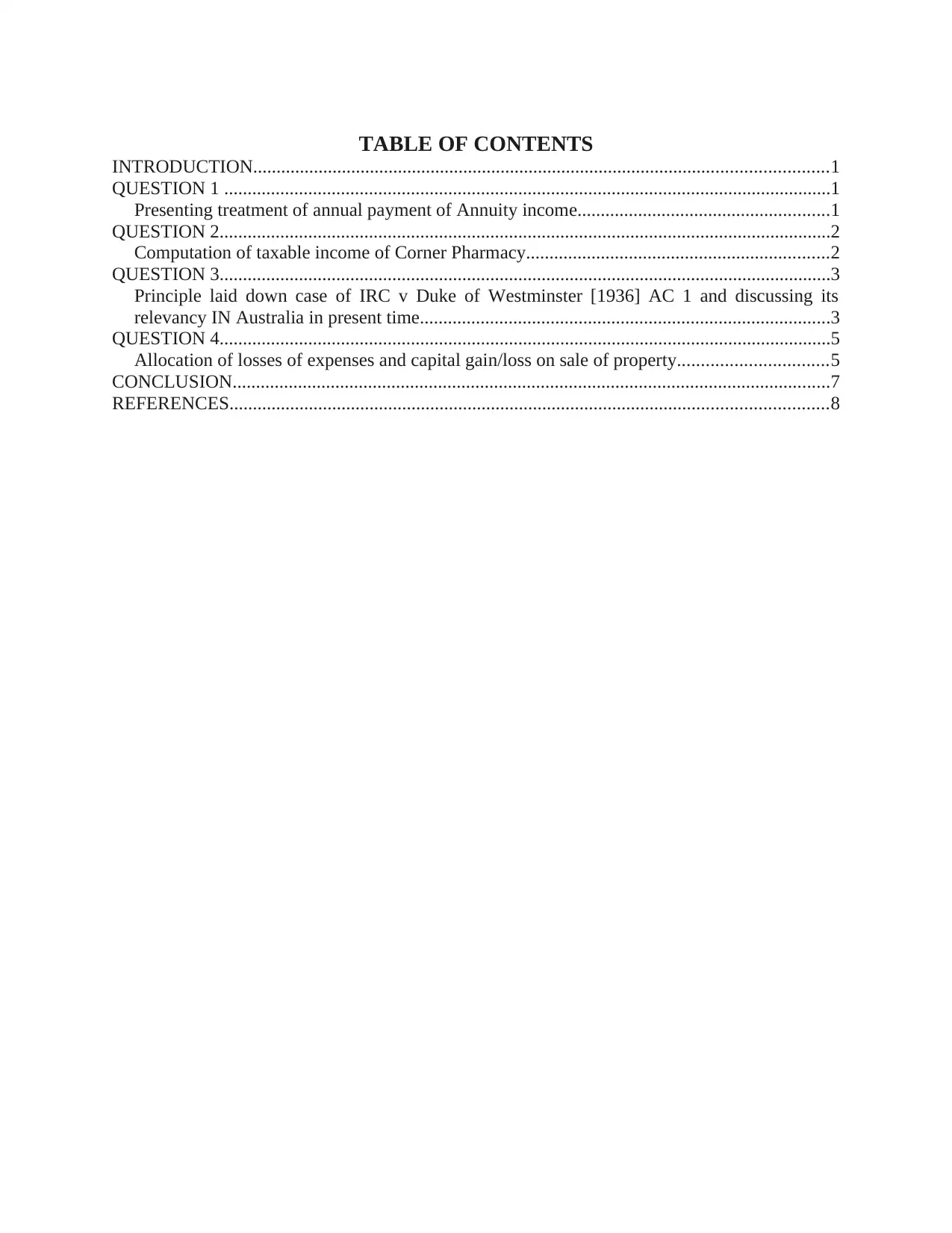
TABLE OF CONTENTS
INTRODUCTION...........................................................................................................................1
QUESTION 1 ..................................................................................................................................1
Presenting treatment of annual payment of Annuity income......................................................1
QUESTION 2...................................................................................................................................2
Computation of taxable income of Corner Pharmacy.................................................................2
QUESTION 3...................................................................................................................................3
Principle laid down case of IRC v Duke of Westminster [1936] AC 1 and discussing its
relevancy IN Australia in present time........................................................................................3
QUESTION 4...................................................................................................................................5
Allocation of losses of expenses and capital gain/loss on sale of property................................5
CONCLUSION................................................................................................................................7
REFERENCES................................................................................................................................8
INTRODUCTION...........................................................................................................................1
QUESTION 1 ..................................................................................................................................1
Presenting treatment of annual payment of Annuity income......................................................1
QUESTION 2...................................................................................................................................2
Computation of taxable income of Corner Pharmacy.................................................................2
QUESTION 3...................................................................................................................................3
Principle laid down case of IRC v Duke of Westminster [1936] AC 1 and discussing its
relevancy IN Australia in present time........................................................................................3
QUESTION 4...................................................................................................................................5
Allocation of losses of expenses and capital gain/loss on sale of property................................5
CONCLUSION................................................................................................................................7
REFERENCES................................................................................................................................8
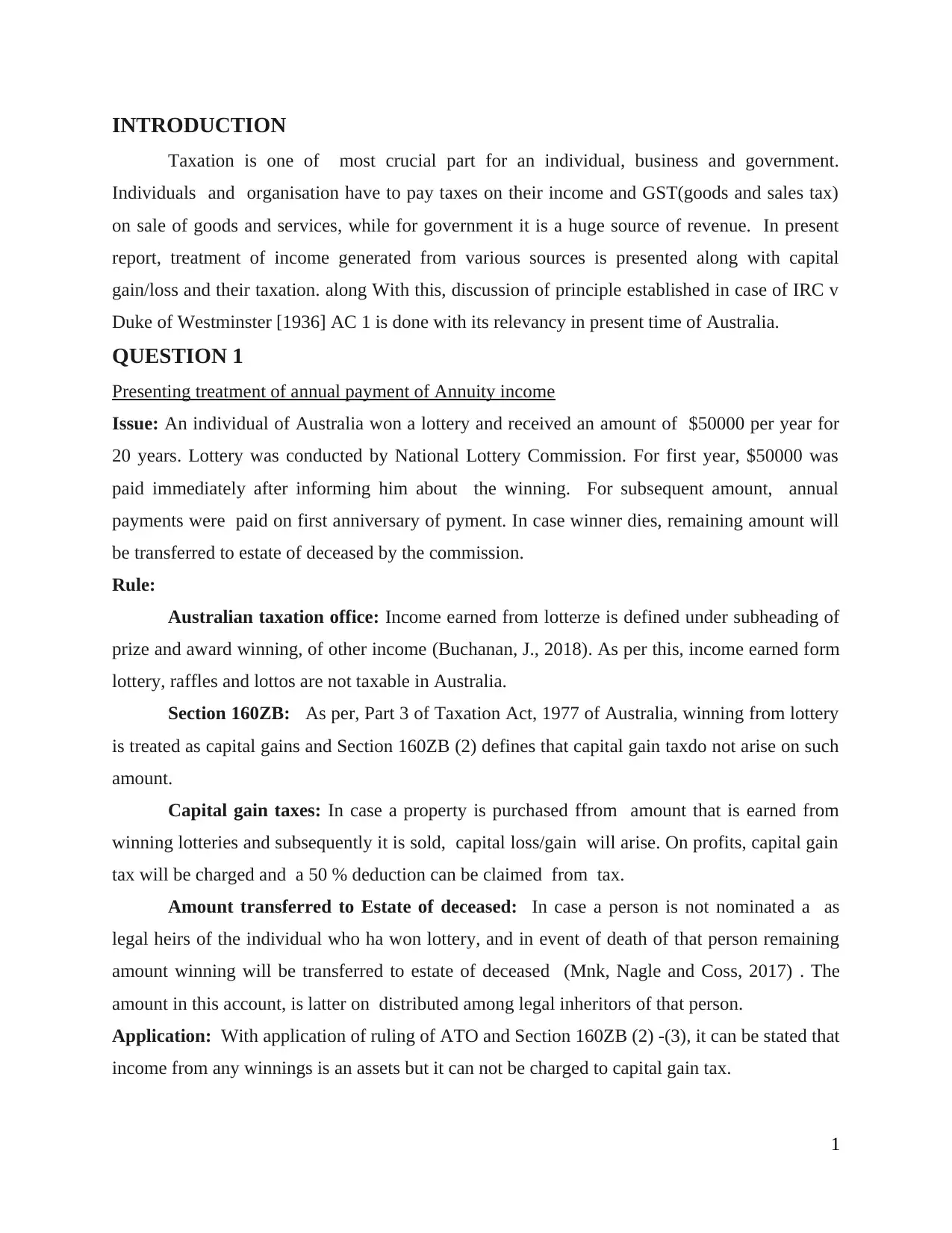
INTRODUCTION
Taxation is one of most crucial part for an individual, business and government.
Individuals and organisation have to pay taxes on their income and GST(goods and sales tax)
on sale of goods and services, while for government it is a huge source of revenue. In present
report, treatment of income generated from various sources is presented along with capital
gain/loss and their taxation. along With this, discussion of principle established in case of IRC v
Duke of Westminster [1936] AC 1 is done with its relevancy in present time of Australia.
QUESTION 1
Presenting treatment of annual payment of Annuity income
Issue: An individual of Australia won a lottery and received an amount of $50000 per year for
20 years. Lottery was conducted by National Lottery Commission. For first year, $50000 was
paid immediately after informing him about the winning. For subsequent amount, annual
payments were paid on first anniversary of pyment. In case winner dies, remaining amount will
be transferred to estate of deceased by the commission.
Rule:
Australian taxation office: Income earned from lotterze is defined under subheading of
prize and award winning, of other income (Buchanan, J., 2018). As per this, income earned form
lottery, raffles and lottos are not taxable in Australia.
Section 160ZB: As per, Part 3 of Taxation Act, 1977 of Australia, winning from lottery
is treated as capital gains and Section 160ZB (2) defines that capital gain taxdo not arise on such
amount.
Capital gain taxes: In case a property is purchased ffrom amount that is earned from
winning lotteries and subsequently it is sold, capital loss/gain will arise. On profits, capital gain
tax will be charged and a 50 % deduction can be claimed from tax.
Amount transferred to Estate of deceased: In case a person is not nominated a as
legal heirs of the individual who ha won lottery, and in event of death of that person remaining
amount winning will be transferred to estate of deceased (Mnk, Nagle and Coss, 2017) . The
amount in this account, is latter on distributed among legal inheritors of that person.
Application: With application of ruling of ATO and Section 160ZB (2) -(3), it can be stated that
income from any winnings is an assets but it can not be charged to capital gain tax.
1
Taxation is one of most crucial part for an individual, business and government.
Individuals and organisation have to pay taxes on their income and GST(goods and sales tax)
on sale of goods and services, while for government it is a huge source of revenue. In present
report, treatment of income generated from various sources is presented along with capital
gain/loss and their taxation. along With this, discussion of principle established in case of IRC v
Duke of Westminster [1936] AC 1 is done with its relevancy in present time of Australia.
QUESTION 1
Presenting treatment of annual payment of Annuity income
Issue: An individual of Australia won a lottery and received an amount of $50000 per year for
20 years. Lottery was conducted by National Lottery Commission. For first year, $50000 was
paid immediately after informing him about the winning. For subsequent amount, annual
payments were paid on first anniversary of pyment. In case winner dies, remaining amount will
be transferred to estate of deceased by the commission.
Rule:
Australian taxation office: Income earned from lotterze is defined under subheading of
prize and award winning, of other income (Buchanan, J., 2018). As per this, income earned form
lottery, raffles and lottos are not taxable in Australia.
Section 160ZB: As per, Part 3 of Taxation Act, 1977 of Australia, winning from lottery
is treated as capital gains and Section 160ZB (2) defines that capital gain taxdo not arise on such
amount.
Capital gain taxes: In case a property is purchased ffrom amount that is earned from
winning lotteries and subsequently it is sold, capital loss/gain will arise. On profits, capital gain
tax will be charged and a 50 % deduction can be claimed from tax.
Amount transferred to Estate of deceased: In case a person is not nominated a as
legal heirs of the individual who ha won lottery, and in event of death of that person remaining
amount winning will be transferred to estate of deceased (Mnk, Nagle and Coss, 2017) . The
amount in this account, is latter on distributed among legal inheritors of that person.
Application: With application of ruling of ATO and Section 160ZB (2) -(3), it can be stated that
income from any winnings is an assets but it can not be charged to capital gain tax.
1
⊘ This is a preview!⊘
Do you want full access?
Subscribe today to unlock all pages.

Trusted by 1+ million students worldwide
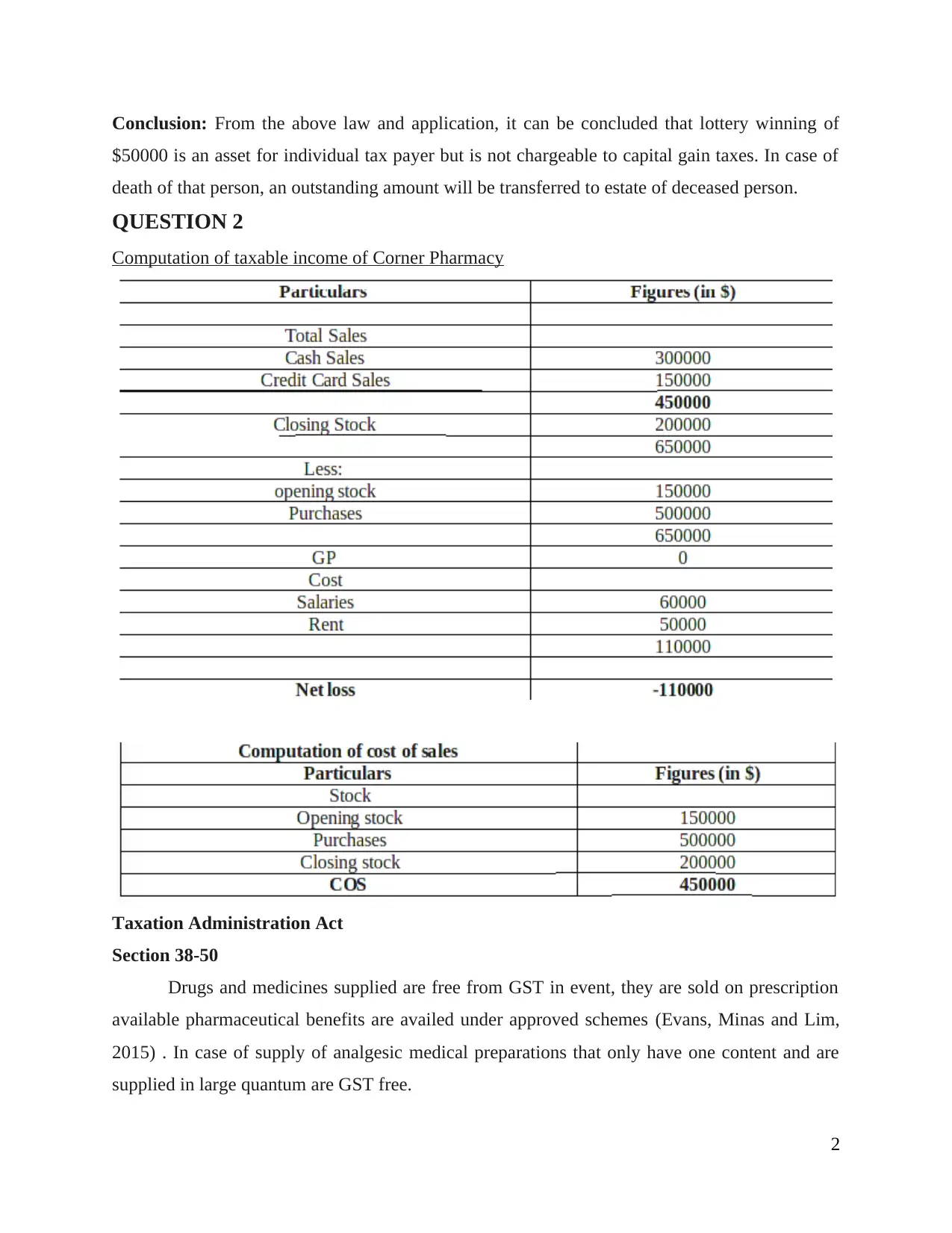
Conclusion: From the above law and application, it can be concluded that lottery winning of
$50000 is an asset for individual tax payer but is not chargeable to capital gain taxes. In case of
death of that person, an outstanding amount will be transferred to estate of deceased person.
QUESTION 2
Computation of taxable income of Corner Pharmacy
Taxation Administration Act
Section 38-50
Drugs and medicines supplied are free from GST in event, they are sold on prescription
available pharmaceutical benefits are availed under approved schemes (Evans, Minas and Lim,
2015) . In case of supply of analgesic medical preparations that only have one content and are
supplied in large quantum are GST free.
2
$50000 is an asset for individual tax payer but is not chargeable to capital gain taxes. In case of
death of that person, an outstanding amount will be transferred to estate of deceased person.
QUESTION 2
Computation of taxable income of Corner Pharmacy
Taxation Administration Act
Section 38-50
Drugs and medicines supplied are free from GST in event, they are sold on prescription
available pharmaceutical benefits are availed under approved schemes (Evans, Minas and Lim,
2015) . In case of supply of analgesic medical preparations that only have one content and are
supplied in large quantum are GST free.
2
Paraphrase This Document
Need a fresh take? Get an instant paraphrase of this document with our AI Paraphraser
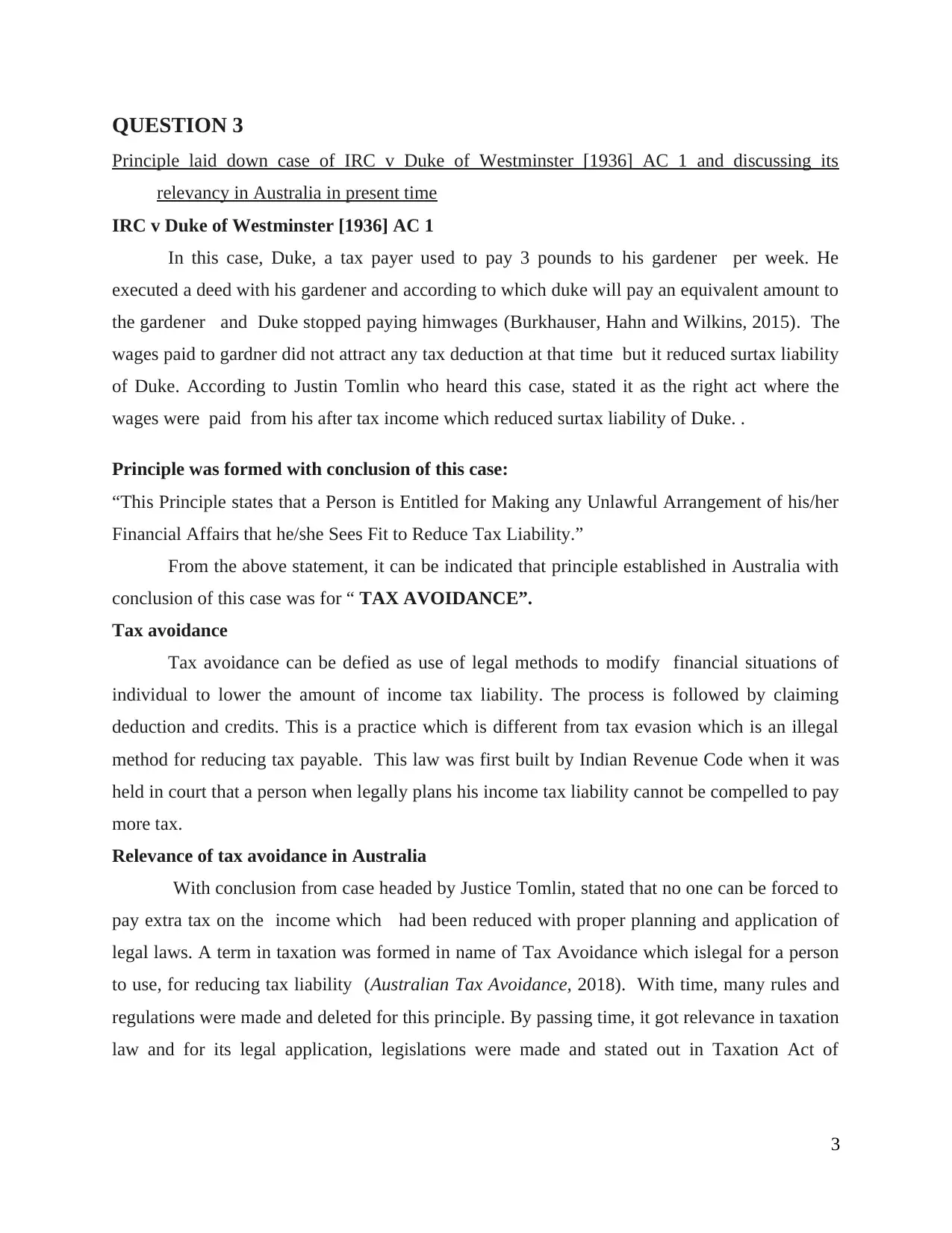
QUESTION 3
Principle laid down case of IRC v Duke of Westminster [1936] AC 1 and discussing its
relevancy in Australia in present time
IRC v Duke of Westminster [1936] AC 1
In this case, Duke, a tax payer used to pay 3 pounds to his gardener per week. He
executed a deed with his gardener and according to which duke will pay an equivalent amount to
the gardener and Duke stopped paying himwages (Burkhauser, Hahn and Wilkins, 2015). The
wages paid to gardner did not attract any tax deduction at that time but it reduced surtax liability
of Duke. According to Justin Tomlin who heard this case, stated it as the right act where the
wages were paid from his after tax income which reduced surtax liability of Duke. .
Principle was formed with conclusion of this case:
“This Principle states that a Person is Entitled for Making any Unlawful Arrangement of his/her
Financial Affairs that he/she Sees Fit to Reduce Tax Liability.”
From the above statement, it can be indicated that principle established in Australia with
conclusion of this case was for “ TAX AVOIDANCE”.
Tax avoidance
Tax avoidance can be defied as use of legal methods to modify financial situations of
individual to lower the amount of income tax liability. The process is followed by claiming
deduction and credits. This is a practice which is different from tax evasion which is an illegal
method for reducing tax payable. This law was first built by Indian Revenue Code when it was
held in court that a person when legally plans his income tax liability cannot be compelled to pay
more tax.
Relevance of tax avoidance in Australia
With conclusion from case headed by Justice Tomlin, stated that no one can be forced to
pay extra tax on the income which had been reduced with proper planning and application of
legal laws. A term in taxation was formed in name of Tax Avoidance which islegal for a person
to use, for reducing tax liability (Australian Tax Avoidance, 2018). With time, many rules and
regulations were made and deleted for this principle. By passing time, it got relevance in taxation
law and for its legal application, legislations were made and stated out in Taxation Act of
3
Principle laid down case of IRC v Duke of Westminster [1936] AC 1 and discussing its
relevancy in Australia in present time
IRC v Duke of Westminster [1936] AC 1
In this case, Duke, a tax payer used to pay 3 pounds to his gardener per week. He
executed a deed with his gardener and according to which duke will pay an equivalent amount to
the gardener and Duke stopped paying himwages (Burkhauser, Hahn and Wilkins, 2015). The
wages paid to gardner did not attract any tax deduction at that time but it reduced surtax liability
of Duke. According to Justin Tomlin who heard this case, stated it as the right act where the
wages were paid from his after tax income which reduced surtax liability of Duke. .
Principle was formed with conclusion of this case:
“This Principle states that a Person is Entitled for Making any Unlawful Arrangement of his/her
Financial Affairs that he/she Sees Fit to Reduce Tax Liability.”
From the above statement, it can be indicated that principle established in Australia with
conclusion of this case was for “ TAX AVOIDANCE”.
Tax avoidance
Tax avoidance can be defied as use of legal methods to modify financial situations of
individual to lower the amount of income tax liability. The process is followed by claiming
deduction and credits. This is a practice which is different from tax evasion which is an illegal
method for reducing tax payable. This law was first built by Indian Revenue Code when it was
held in court that a person when legally plans his income tax liability cannot be compelled to pay
more tax.
Relevance of tax avoidance in Australia
With conclusion from case headed by Justice Tomlin, stated that no one can be forced to
pay extra tax on the income which had been reduced with proper planning and application of
legal laws. A term in taxation was formed in name of Tax Avoidance which islegal for a person
to use, for reducing tax liability (Australian Tax Avoidance, 2018). With time, many rules and
regulations were made and deleted for this principle. By passing time, it got relevance in taxation
law and for its legal application, legislations were made and stated out in Taxation Act of
3
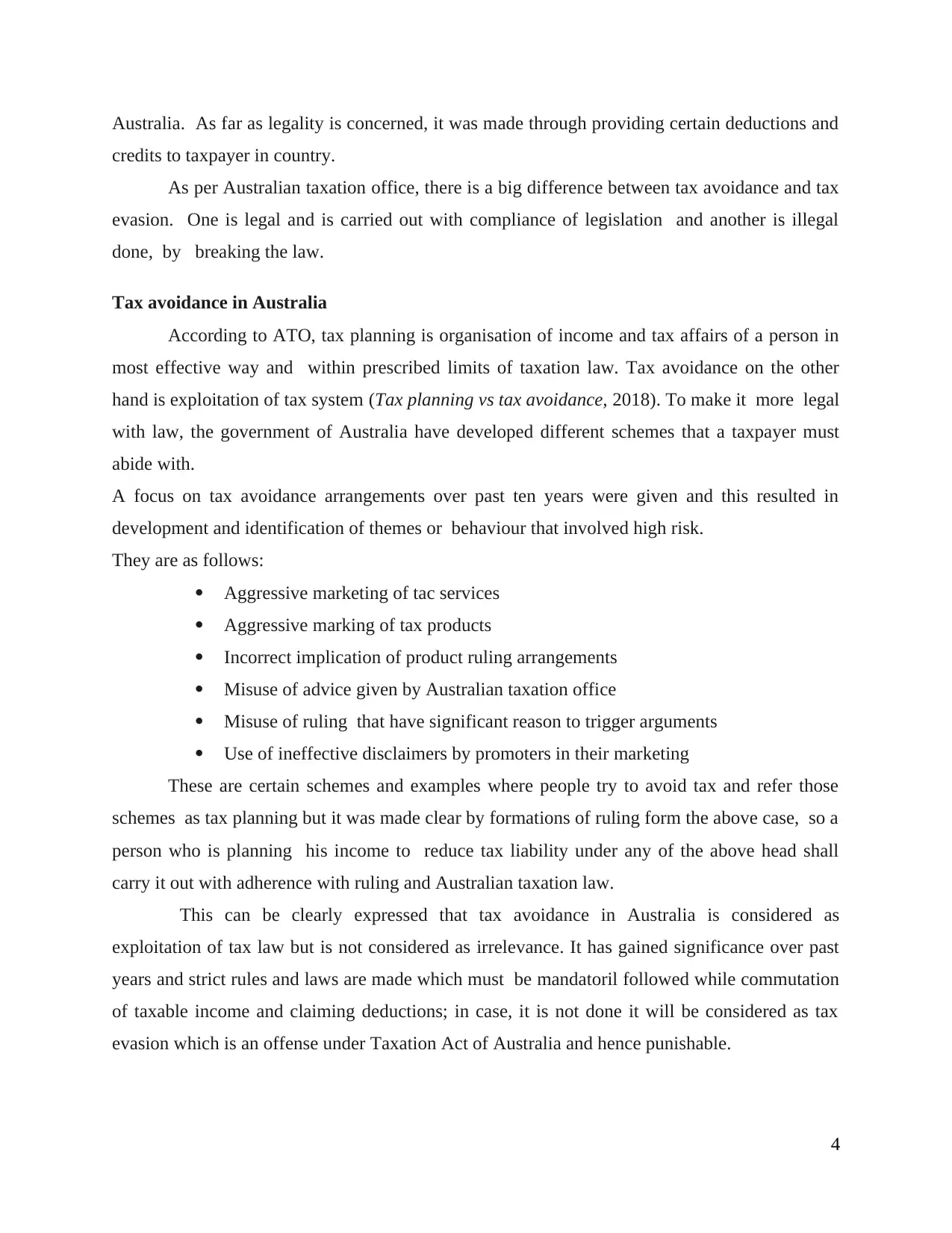
Australia. As far as legality is concerned, it was made through providing certain deductions and
credits to taxpayer in country.
As per Australian taxation office, there is a big difference between tax avoidance and tax
evasion. One is legal and is carried out with compliance of legislation and another is illegal
done, by breaking the law.
Tax avoidance in Australia
According to ATO, tax planning is organisation of income and tax affairs of a person in
most effective way and within prescribed limits of taxation law. Tax avoidance on the other
hand is exploitation of tax system (Tax planning vs tax avoidance, 2018). To make it more legal
with law, the government of Australia have developed different schemes that a taxpayer must
abide with.
A focus on tax avoidance arrangements over past ten years were given and this resulted in
development and identification of themes or behaviour that involved high risk.
They are as follows:
Aggressive marketing of tac services
Aggressive marking of tax products
Incorrect implication of product ruling arrangements
Misuse of advice given by Australian taxation office
Misuse of ruling that have significant reason to trigger arguments
Use of ineffective disclaimers by promoters in their marketing
These are certain schemes and examples where people try to avoid tax and refer those
schemes as tax planning but it was made clear by formations of ruling form the above case, so a
person who is planning his income to reduce tax liability under any of the above head shall
carry it out with adherence with ruling and Australian taxation law.
This can be clearly expressed that tax avoidance in Australia is considered as
exploitation of tax law but is not considered as irrelevance. It has gained significance over past
years and strict rules and laws are made which must be mandatoril followed while commutation
of taxable income and claiming deductions; in case, it is not done it will be considered as tax
evasion which is an offense under Taxation Act of Australia and hence punishable.
4
credits to taxpayer in country.
As per Australian taxation office, there is a big difference between tax avoidance and tax
evasion. One is legal and is carried out with compliance of legislation and another is illegal
done, by breaking the law.
Tax avoidance in Australia
According to ATO, tax planning is organisation of income and tax affairs of a person in
most effective way and within prescribed limits of taxation law. Tax avoidance on the other
hand is exploitation of tax system (Tax planning vs tax avoidance, 2018). To make it more legal
with law, the government of Australia have developed different schemes that a taxpayer must
abide with.
A focus on tax avoidance arrangements over past ten years were given and this resulted in
development and identification of themes or behaviour that involved high risk.
They are as follows:
Aggressive marketing of tac services
Aggressive marking of tax products
Incorrect implication of product ruling arrangements
Misuse of advice given by Australian taxation office
Misuse of ruling that have significant reason to trigger arguments
Use of ineffective disclaimers by promoters in their marketing
These are certain schemes and examples where people try to avoid tax and refer those
schemes as tax planning but it was made clear by formations of ruling form the above case, so a
person who is planning his income to reduce tax liability under any of the above head shall
carry it out with adherence with ruling and Australian taxation law.
This can be clearly expressed that tax avoidance in Australia is considered as
exploitation of tax law but is not considered as irrelevance. It has gained significance over past
years and strict rules and laws are made which must be mandatoril followed while commutation
of taxable income and claiming deductions; in case, it is not done it will be considered as tax
evasion which is an offense under Taxation Act of Australia and hence punishable.
4
⊘ This is a preview!⊘
Do you want full access?
Subscribe today to unlock all pages.

Trusted by 1+ million students worldwide
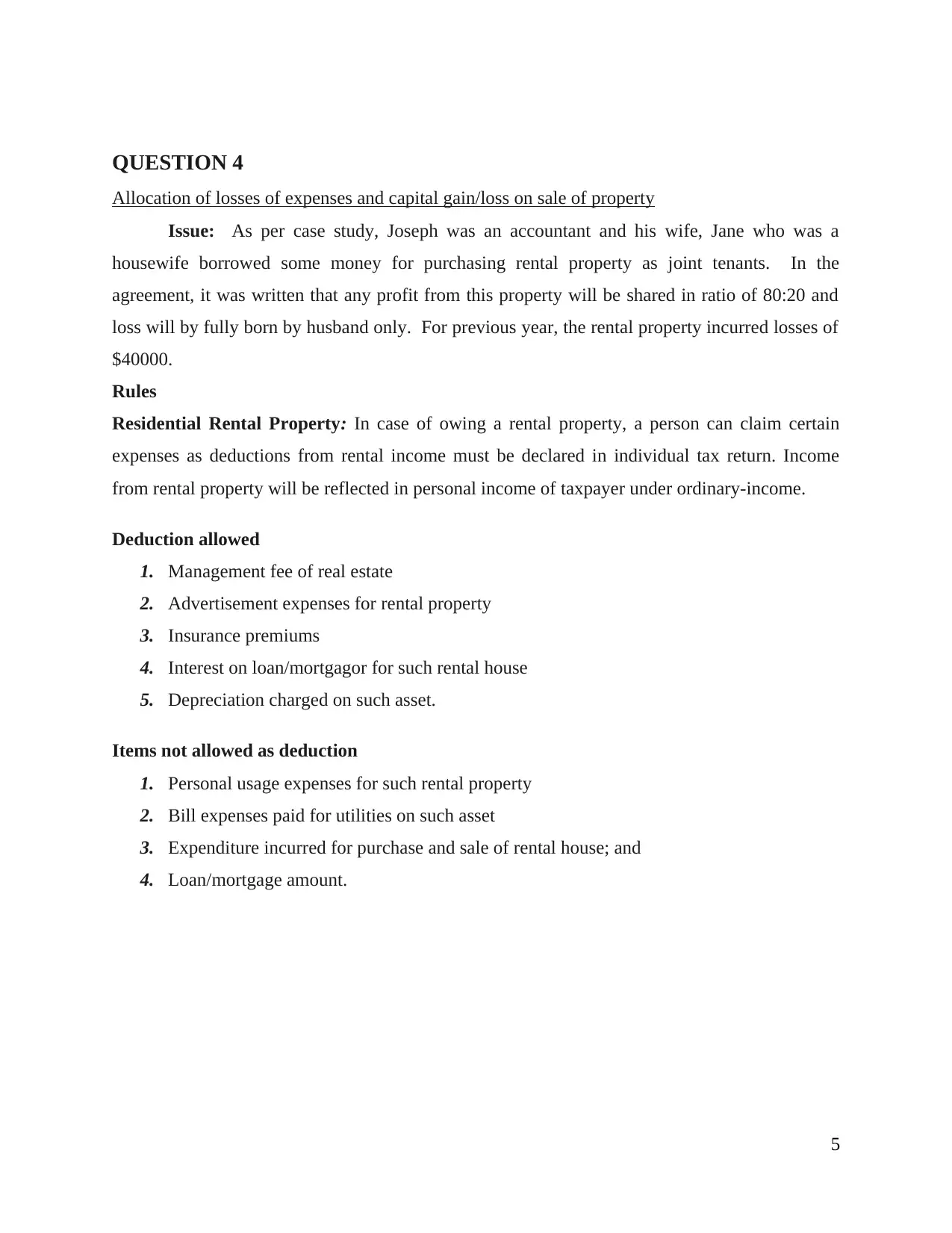
QUESTION 4
Allocation of losses of expenses and capital gain/loss on sale of property
Issue: As per case study, Joseph was an accountant and his wife, Jane who was a
housewife borrowed some money for purchasing rental property as joint tenants. In the
agreement, it was written that any profit from this property will be shared in ratio of 80:20 and
loss will by fully born by husband only. For previous year, the rental property incurred losses of
$40000.
Rules
Residential Rental Property: In case of owing a rental property, a person can claim certain
expenses as deductions from rental income must be declared in individual tax return. Income
from rental property will be reflected in personal income of taxpayer under ordinary-income.
Deduction allowed
1. Management fee of real estate
2. Advertisement expenses for rental property
3. Insurance premiums
4. Interest on loan/mortgagor for such rental house
5. Depreciation charged on such asset.
Items not allowed as deduction
1. Personal usage expenses for such rental property
2. Bill expenses paid for utilities on such asset
3. Expenditure incurred for purchase and sale of rental house; and
4. Loan/mortgage amount.
5
Allocation of losses of expenses and capital gain/loss on sale of property
Issue: As per case study, Joseph was an accountant and his wife, Jane who was a
housewife borrowed some money for purchasing rental property as joint tenants. In the
agreement, it was written that any profit from this property will be shared in ratio of 80:20 and
loss will by fully born by husband only. For previous year, the rental property incurred losses of
$40000.
Rules
Residential Rental Property: In case of owing a rental property, a person can claim certain
expenses as deductions from rental income must be declared in individual tax return. Income
from rental property will be reflected in personal income of taxpayer under ordinary-income.
Deduction allowed
1. Management fee of real estate
2. Advertisement expenses for rental property
3. Insurance premiums
4. Interest on loan/mortgagor for such rental house
5. Depreciation charged on such asset.
Items not allowed as deduction
1. Personal usage expenses for such rental property
2. Bill expenses paid for utilities on such asset
3. Expenditure incurred for purchase and sale of rental house; and
4. Loan/mortgage amount.
5
Paraphrase This Document
Need a fresh take? Get an instant paraphrase of this document with our AI Paraphraser
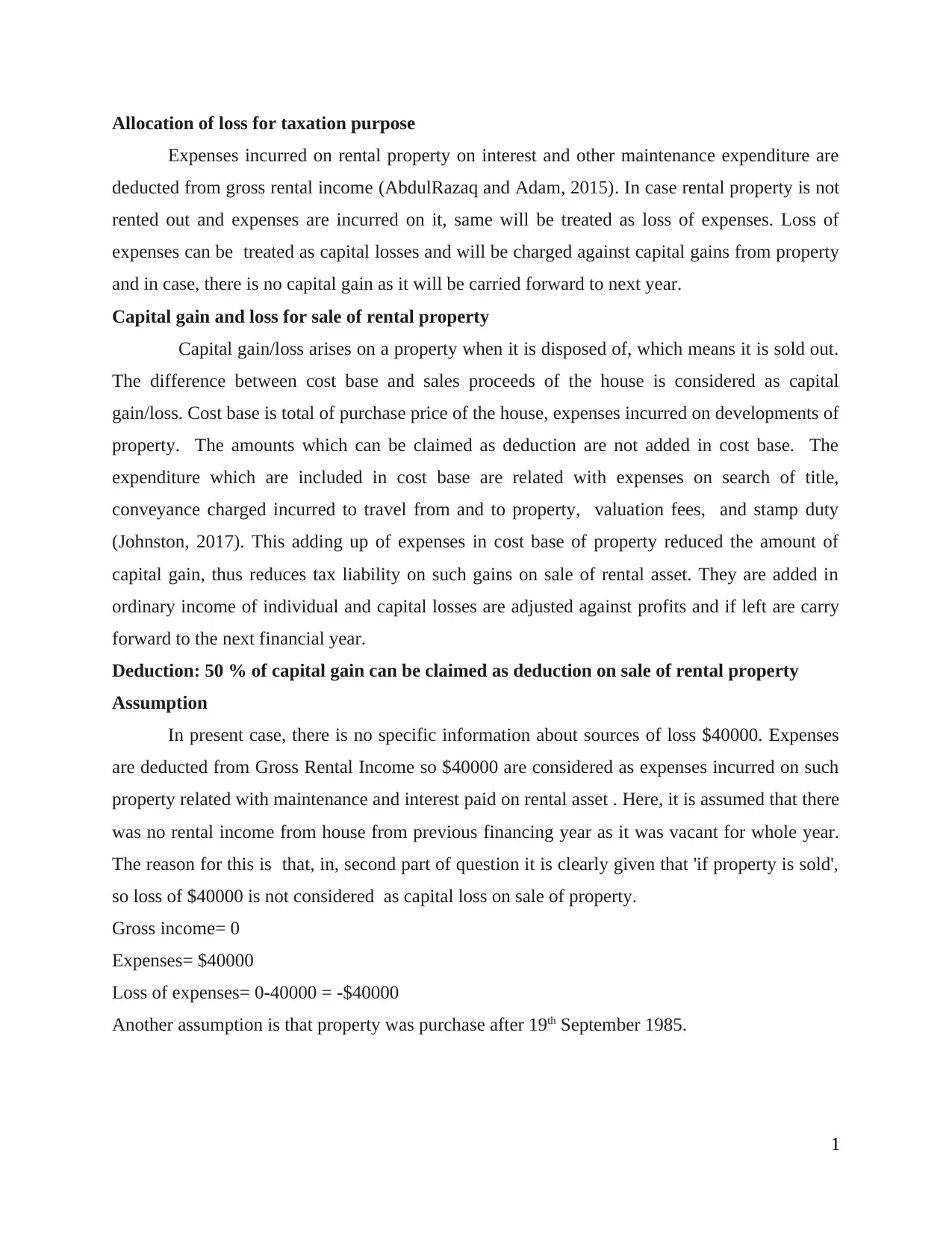
Allocation of loss for taxation purpose
Expenses incurred on rental property on interest and other maintenance expenditure are
deducted from gross rental income (AbdulRazaq and Adam, 2015). In case rental property is not
rented out and expenses are incurred on it, same will be treated as loss of expenses. Loss of
expenses can be treated as capital losses and will be charged against capital gains from property
and in case, there is no capital gain as it will be carried forward to next year.
Capital gain and loss for sale of rental property
Capital gain/loss arises on a property when it is disposed of, which means it is sold out.
The difference between cost base and sales proceeds of the house is considered as capital
gain/loss. Cost base is total of purchase price of the house, expenses incurred on developments of
property. The amounts which can be claimed as deduction are not added in cost base. The
expenditure which are included in cost base are related with expenses on search of title,
conveyance charged incurred to travel from and to property, valuation fees, and stamp duty
(Johnston, 2017). This adding up of expenses in cost base of property reduced the amount of
capital gain, thus reduces tax liability on such gains on sale of rental asset. They are added in
ordinary income of individual and capital losses are adjusted against profits and if left are carry
forward to the next financial year.
Deduction: 50 % of capital gain can be claimed as deduction on sale of rental property
Assumption
In present case, there is no specific information about sources of loss $40000. Expenses
are deducted from Gross Rental Income so $40000 are considered as expenses incurred on such
property related with maintenance and interest paid on rental asset . Here, it is assumed that there
was no rental income from house from previous financing year as it was vacant for whole year.
The reason for this is that, in, second part of question it is clearly given that 'if property is sold',
so loss of $40000 is not considered as capital loss on sale of property.
Gross income= 0
Expenses= $40000
Loss of expenses= 0-40000 = -$40000
Another assumption is that property was purchase after 19th September 1985.
1
Expenses incurred on rental property on interest and other maintenance expenditure are
deducted from gross rental income (AbdulRazaq and Adam, 2015). In case rental property is not
rented out and expenses are incurred on it, same will be treated as loss of expenses. Loss of
expenses can be treated as capital losses and will be charged against capital gains from property
and in case, there is no capital gain as it will be carried forward to next year.
Capital gain and loss for sale of rental property
Capital gain/loss arises on a property when it is disposed of, which means it is sold out.
The difference between cost base and sales proceeds of the house is considered as capital
gain/loss. Cost base is total of purchase price of the house, expenses incurred on developments of
property. The amounts which can be claimed as deduction are not added in cost base. The
expenditure which are included in cost base are related with expenses on search of title,
conveyance charged incurred to travel from and to property, valuation fees, and stamp duty
(Johnston, 2017). This adding up of expenses in cost base of property reduced the amount of
capital gain, thus reduces tax liability on such gains on sale of rental asset. They are added in
ordinary income of individual and capital losses are adjusted against profits and if left are carry
forward to the next financial year.
Deduction: 50 % of capital gain can be claimed as deduction on sale of rental property
Assumption
In present case, there is no specific information about sources of loss $40000. Expenses
are deducted from Gross Rental Income so $40000 are considered as expenses incurred on such
property related with maintenance and interest paid on rental asset . Here, it is assumed that there
was no rental income from house from previous financing year as it was vacant for whole year.
The reason for this is that, in, second part of question it is clearly given that 'if property is sold',
so loss of $40000 is not considered as capital loss on sale of property.
Gross income= 0
Expenses= $40000
Loss of expenses= 0-40000 = -$40000
Another assumption is that property was purchase after 19th September 1985.
1
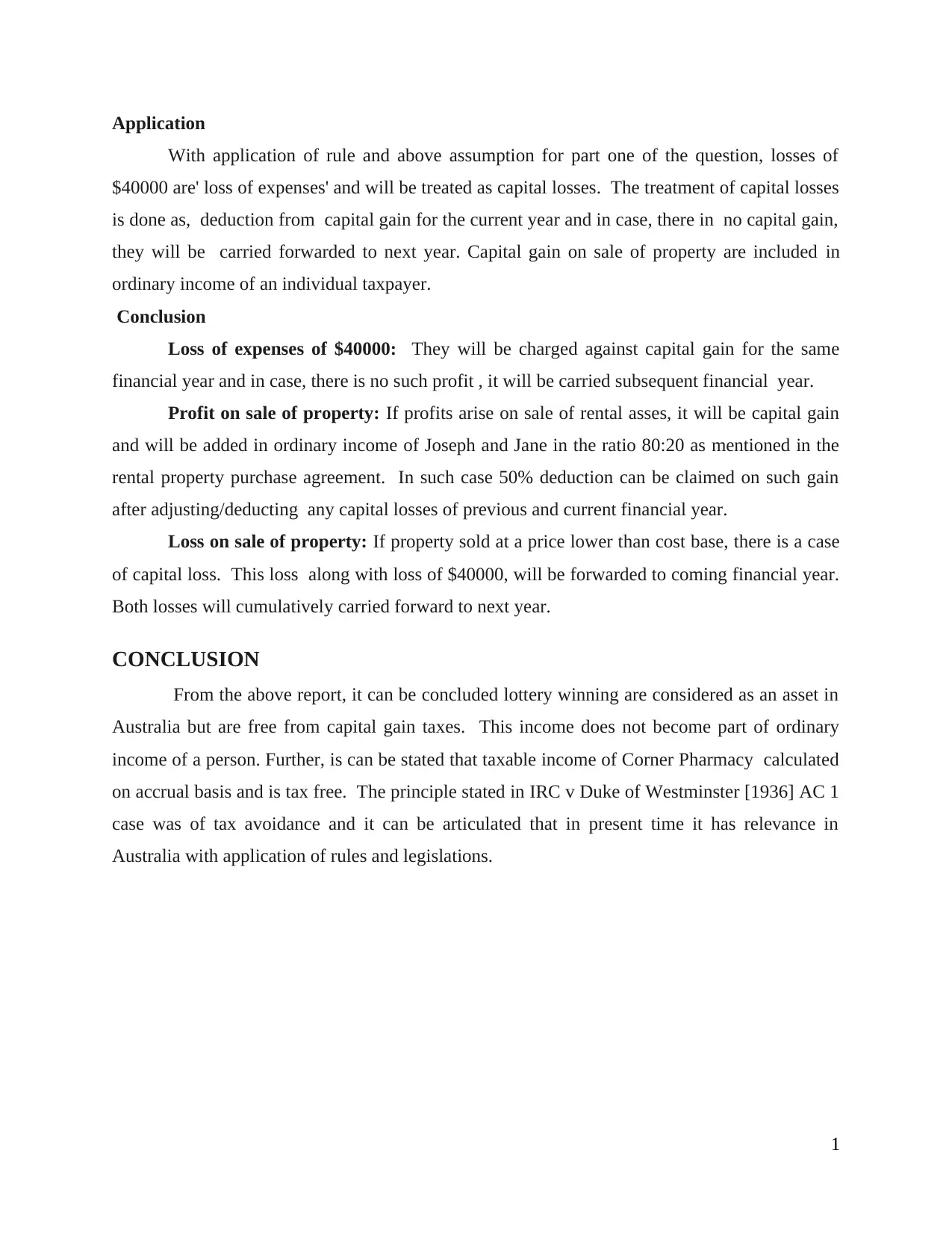
Application
With application of rule and above assumption for part one of the question, losses of
$40000 are' loss of expenses' and will be treated as capital losses. The treatment of capital losses
is done as, deduction from capital gain for the current year and in case, there in no capital gain,
they will be carried forwarded to next year. Capital gain on sale of property are included in
ordinary income of an individual taxpayer.
Conclusion
Loss of expenses of $40000: They will be charged against capital gain for the same
financial year and in case, there is no such profit , it will be carried subsequent financial year.
Profit on sale of property: If profits arise on sale of rental asses, it will be capital gain
and will be added in ordinary income of Joseph and Jane in the ratio 80:20 as mentioned in the
rental property purchase agreement. In such case 50% deduction can be claimed on such gain
after adjusting/deducting any capital losses of previous and current financial year.
Loss on sale of property: If property sold at a price lower than cost base, there is a case
of capital loss. This loss along with loss of $40000, will be forwarded to coming financial year.
Both losses will cumulatively carried forward to next year.
CONCLUSION
From the above report, it can be concluded lottery winning are considered as an asset in
Australia but are free from capital gain taxes. This income does not become part of ordinary
income of a person. Further, is can be stated that taxable income of Corner Pharmacy calculated
on accrual basis and is tax free. The principle stated in IRC v Duke of Westminster [1936] AC 1
case was of tax avoidance and it can be articulated that in present time it has relevance in
Australia with application of rules and legislations.
1
With application of rule and above assumption for part one of the question, losses of
$40000 are' loss of expenses' and will be treated as capital losses. The treatment of capital losses
is done as, deduction from capital gain for the current year and in case, there in no capital gain,
they will be carried forwarded to next year. Capital gain on sale of property are included in
ordinary income of an individual taxpayer.
Conclusion
Loss of expenses of $40000: They will be charged against capital gain for the same
financial year and in case, there is no such profit , it will be carried subsequent financial year.
Profit on sale of property: If profits arise on sale of rental asses, it will be capital gain
and will be added in ordinary income of Joseph and Jane in the ratio 80:20 as mentioned in the
rental property purchase agreement. In such case 50% deduction can be claimed on such gain
after adjusting/deducting any capital losses of previous and current financial year.
Loss on sale of property: If property sold at a price lower than cost base, there is a case
of capital loss. This loss along with loss of $40000, will be forwarded to coming financial year.
Both losses will cumulatively carried forward to next year.
CONCLUSION
From the above report, it can be concluded lottery winning are considered as an asset in
Australia but are free from capital gain taxes. This income does not become part of ordinary
income of a person. Further, is can be stated that taxable income of Corner Pharmacy calculated
on accrual basis and is tax free. The principle stated in IRC v Duke of Westminster [1936] AC 1
case was of tax avoidance and it can be articulated that in present time it has relevance in
Australia with application of rules and legislations.
1
⊘ This is a preview!⊘
Do you want full access?
Subscribe today to unlock all pages.

Trusted by 1+ million students worldwide
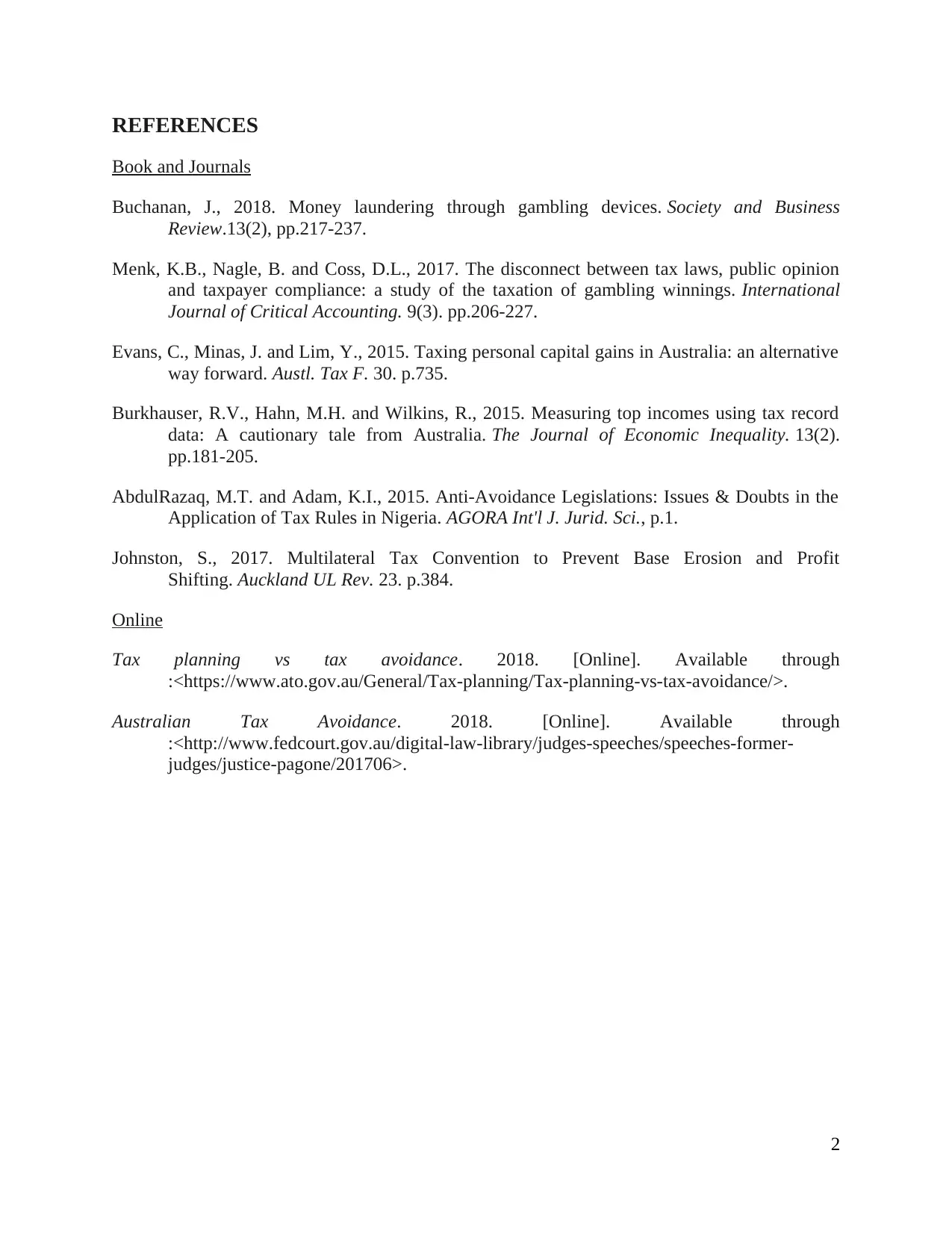
REFERENCES
Book and Journals
Buchanan, J., 2018. Money laundering through gambling devices. Society and Business
Review.13(2), pp.217-237.
Menk, K.B., Nagle, B. and Coss, D.L., 2017. The disconnect between tax laws, public opinion
and taxpayer compliance: a study of the taxation of gambling winnings. International
Journal of Critical Accounting. 9(3). pp.206-227.
Evans, C., Minas, J. and Lim, Y., 2015. Taxing personal capital gains in Australia: an alternative
way forward. Austl. Tax F. 30. p.735.
Burkhauser, R.V., Hahn, M.H. and Wilkins, R., 2015. Measuring top incomes using tax record
data: A cautionary tale from Australia. The Journal of Economic Inequality. 13(2).
pp.181-205.
AbdulRazaq, M.T. and Adam, K.I., 2015. Anti-Avoidance Legislations: Issues & Doubts in the
Application of Tax Rules in Nigeria. AGORA Int'l J. Jurid. Sci., p.1.
Johnston, S., 2017. Multilateral Tax Convention to Prevent Base Erosion and Profit
Shifting. Auckland UL Rev. 23. p.384.
Online
Tax planning vs tax avoidance. 2018. [Online]. Available through
:<https://www.ato.gov.au/General/Tax-planning/Tax-planning-vs-tax-avoidance/>.
Australian Tax Avoidance. 2018. [Online]. Available through
:<http://www.fedcourt.gov.au/digital-law-library/judges-speeches/speeches-former-
judges/justice-pagone/201706>.
2
Book and Journals
Buchanan, J., 2018. Money laundering through gambling devices. Society and Business
Review.13(2), pp.217-237.
Menk, K.B., Nagle, B. and Coss, D.L., 2017. The disconnect between tax laws, public opinion
and taxpayer compliance: a study of the taxation of gambling winnings. International
Journal of Critical Accounting. 9(3). pp.206-227.
Evans, C., Minas, J. and Lim, Y., 2015. Taxing personal capital gains in Australia: an alternative
way forward. Austl. Tax F. 30. p.735.
Burkhauser, R.V., Hahn, M.H. and Wilkins, R., 2015. Measuring top incomes using tax record
data: A cautionary tale from Australia. The Journal of Economic Inequality. 13(2).
pp.181-205.
AbdulRazaq, M.T. and Adam, K.I., 2015. Anti-Avoidance Legislations: Issues & Doubts in the
Application of Tax Rules in Nigeria. AGORA Int'l J. Jurid. Sci., p.1.
Johnston, S., 2017. Multilateral Tax Convention to Prevent Base Erosion and Profit
Shifting. Auckland UL Rev. 23. p.384.
Online
Tax planning vs tax avoidance. 2018. [Online]. Available through
:<https://www.ato.gov.au/General/Tax-planning/Tax-planning-vs-tax-avoidance/>.
Australian Tax Avoidance. 2018. [Online]. Available through
:<http://www.fedcourt.gov.au/digital-law-library/judges-speeches/speeches-former-
judges/justice-pagone/201706>.
2
1 out of 10
Related Documents
Your All-in-One AI-Powered Toolkit for Academic Success.
+13062052269
info@desklib.com
Available 24*7 on WhatsApp / Email
![[object Object]](/_next/static/media/star-bottom.7253800d.svg)
Unlock your academic potential
Copyright © 2020–2025 A2Z Services. All Rights Reserved. Developed and managed by ZUCOL.





